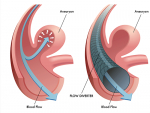Displaying items by tag: division of cardiovascular disease
This study highlights how high-volume centers, where operators perform these procedures more frequently, achieve better outcomes, including lower 30-day mortality and reduced complication rates.
AFib is expected to affect 40 million people worldwide and can be fatal if not treated. UAB experts provide tips on symptoms, risk factors and management of this condition.
The NIH grant will support development of a BionanomatrixTM coating for an aneurysm-therapy flow diverter in the brain.
Tagged under
Linda Morgan’s transplant journey has inspired many and will continue to do so as she shares her story with the world.
Tagged under
Researchers at UAB shed light on the link between genetic variants and cardiovascular risk factors in determining heart health.
For 11 consecutive years, U.S. News has named UAB Hospital the best hospital in Alabama, with several specialties and procedures ranked among the best.
Tagged under
- release
- uab medicine
- uab hospital
- school of medicine
- department of obstetrics and gynecology
- department of neurology
- department of neurosurgery
- department of otolaryngology
- division of gerontology geriatrics and palliative care
- division of pulmonary allergy and critical care medicine
- division of endocrinology diabetes and metabolism
- department of urology
- department of orthopaedics
- division of gastroenterology and hepatology
- division of gastrointestinal surgery
- division of cardiovascular disease
- division of cardiothoracic surgery
- department of orthopaedic surgery
Tagged under
This procedure has been clinically proved to help reduce blood pressure in patients for whom neither medications nor lifestyle changes have been successful.
UAB researchers leverage data from the All of Us Research Program to show that carpal tunnel syndrome is a sentinel event for cardiac amyloidosis.
Tagged under
The device will be used to treat patients with symptomatic severe aortic stenosis who are at high or extreme risk for open-heart surgery.
Tagged under
The program is designed specifically to treat women and address the distinct concerns and unique risk factors that women may experience.
Tagged under
A large nationwide study found that Black individuals carrying a genetic mutation in the TTN gene were at an increased risk of adverse clinical outcomes.
Tagged under
Pulsed-field ablation disrupts the cellular membranes of vein tissue, irreversibly preventing those membranes from conducting electricity. This protects the heart from the rapid impulses which can cause atrial fibrillation.
Tagged under
UAB researchers leverage data from the SPRINT trial to show that intensive control of blood pressure reduces troponin I levels and this decrease in troponin I levels is associated with reduced risk of cardiovascular disease.
Although living with his congenital heart defect has come with its challenges, Bill Wingate hopes he can encourage others with similar conditions.
Tagged under
Tagged under
A post-hoc analysis of critically ill COVID-19 patients revealed that high-dose inhaled nitric oxide therapy was more beneficial in reducing the risk of mortality in Black patients compared with their white counterparts.
At 15 months old, Brooke Miley Lillie received a heart transplant. At 19, she received a kidney. At 27, she defied the odds and delivered her first daughter at UAB Hospital.
Tagged under
- release
- department of surgery
- division of cardiothoracic surgery
- division of transplantation
- comprehensive transplant institute
- department of medicine
- division of cardiovascular disease
- division of nephrology
- department of obstetrics and gynecology
- division of maternal fetal medicine
- department of pediatrics
- division of neonatology
- women and infants services
- uab hospital



















